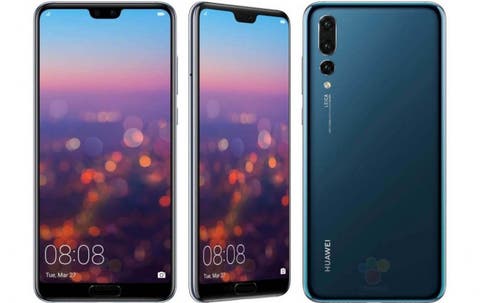Arguably the most highly anticipated and most talked about Android phones of the year, second to the Galaxy S9 duo are finally here. Huawei technologies a moment ago finally unveiled the Huawei P20 and P20 pro, both of which feature the trendy notched screens, stereo speakers and various camera improvements including the new Leica Triple Camera.
Th Huawei P20 is a beauty to behold, it is made entirely of curved glass back and a metal frame like you will find in some modern flagship devices. Its design is inspired by the iPhone X featuring a small notch at the top of the display wherein there are the earpiece and the front-facing camera, and given the 18:7:9 aspect ratio and the display notch, the display front of the Huawei P20 only got a minimal size of bezels on either side of the display, with an always-on fingerprint reader, which doubles as a multi-purpose control key sitting right on the bottom bezels. While many might not be fans of the Notched screens, Huawei has a provision that allows you to camouflage the notch by darkening the screen around it.
On the flip side, the P20 has its camera module with the Leica-branding and the Huawei logo all vertically arranged on the one side of the device, while the other side is completely bare with a radiating color. The P20 is IP53 rated for dust and splash resistance.
The Huawei P20 and P20 pro are two identical devices with a few structural and internal differences.
Huawei P20
The Huawei P20 happens to be the smallest and the most basic of the duo, featuring a 5.8″ LCD with the top notch, a resolution of 1,080 x 2,244 pixels, and is powered by a the Octa-core Kirin 970 chipset with its dedicated NPU for machine learning acceleration, Mali-G72MP12, 4GB of RAM and 64GB of storage. The device is a hybrid SIM device, so the storage can only be expanded if you forgo the second SIM slot.
One of the highlights of the Huawei P20 is the camera sensor inside the notched screen. The device has a 24MP front camera with f/2.0 lens and a LED flash. The device supports face Unlock and is capable of bokeh and studio-lightning effects.
On the flip side is a Leica-branded dual camera setup, featuring a 12MP f/1.8 color (RGB) sensor and a 20MP f/1.6 black and white (monochrome) sensor. The company claims the 12MP camera is 61% larger pixels the same 12MP camera found in some of its previous flagships. The P20 camera features include a dual-tone LED flash, 4-way autofocus (PDAF, laser, contrast, and depth detection), 2x lossless zoom, 720p@960fps slow-mo videos and a couple of AI features.
The device comes with a 3,400 mAh battery with support for Huawei’s Super Charge and boots Android 8.1 with EMUI 8.1 out of the box.
The Huawei P20 is the most advanced of the duo, it has a similar design, but it is now IP67 rated for dust and water resistance, and comes with a unique feature that may in no distant time be adopted by most OEMs. The device is the first smartphone to feature a triple rear camera, HMD Global was earlier rumored to be working on a Penta camera phone, but that never materialized.
At the back of the Huawei P20 pro is a 40-megapixel primary sensor, with f/1.8 lens, A.I. Image Stabilization (AIS) and an 8-megapixel sensor with f/2.4 telephoto lens and OIS, coupled with a third standalone 20-megapixel mono lens.
Similarly, the P20 pro camera comes with dual tone LED flash, 4-way autofocus, 720p@960fps slow-mo capturing, maximum ISO of 102,400, 3x optical zoom and 5x hybrid zoom.
The front-facing camera is same as with the base P20, runs on same Android OS, but gets a larger 4,000 mAh battery with Super Charge that can achieve up to 58% charge in 30 minutes.
Other specs include a 6.1″ OLED screen with 1,080 x 2,244 pixel resolution, powered by the same Kirin 970 chipset with Mali-G72MP12 GPU, 6GB of RAM and 128GB expandable storage.
Pricing and Availability
The P20 will go for €649, while the P20 Pro will cost an additional €250. Update on availability in Europe, and in the global market will be available shortly.
